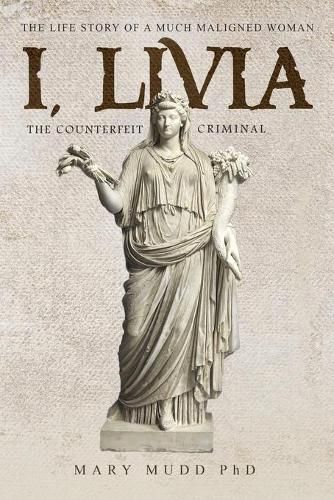Readings Newsletter
Become a Readings Member to make your shopping experience even easier.
Sign in or sign up for free!
You’re not far away from qualifying for FREE standard shipping within Australia
You’ve qualified for FREE standard shipping within Australia
The cart is loading…






This title is printed to order. This book may have been self-published. If so, we cannot guarantee the quality of the content. In the main most books will have gone through the editing process however some may not. We therefore suggest that you be aware of this before ordering this book. If in doubt check either the author or publisher’s details as we are unable to accept any returns unless they are faulty. Please contact us if you have any questions.
A historical tradition of Roman origin represents Livia Drusilla, the third and much-beloved wife of Caesar Augustus, as a conniving, Borgia-like criminal. This view of Livia maintains that to promote the political career of her son by her former husband, Livia killed or incapacitated Augustus’ descendants through his previous wife. Author Robert Graves, in his famous novel, I, Claudius, based his fictitious rendering of Livia upon this malevolent representation of her. The conceit is patently wrong, and essentially all modern scholars of Roman history reject it. But thanks to Graves’ immensely entertaining book, and the British Broadcasting Corporation adaptation of it for television, the image of Livia as a devious dynastic murderess prevails in the popular mind.
I, Livia: The Counterfeit Criminal aspires to correct the misconception, and present an accurate assessment of this much-maligned woman. The study’s comfortably readable style is intended for general audiences.
The first three chapters present a biographical sketch, focused upon Livia’s public life. Livia was accepted as an extraordinarily visible, dynamic and influential political personage, by a society and culture which maintained women must confine their activities childrearing and other domestic pursuits. The following two chapters demonstrate the absurdity of Livia’s criminal reputation, and offer explanation for its development.
Three subsequent chapters seek Livia’s private side - her habits, tastes, and interpersonal relationships. Livia (who suffered from colds and chronic arthritis) was an amiable soul with a self-deprecating sense of humor. She was a loving, supportive, forbearant wife and mother, an intellectual with profound political insights, an enthusiastic traveller, a connoisseur of art. Although generally patient and demure, she could also be impulsive, assertive, opinionated and, especially in later life, petulant.
The final chapter examines how Livia became, and remained, a symbol of Roman imperial power. The brief epilogue describes the physical appearances of Livia and the members of her family. Also included are relevant appendices, a comprehensive bibliography, and color images of surviving wall paintings from her homes.
$9.00 standard shipping within Australia
FREE standard shipping within Australia for orders over $100.00
Express & International shipping calculated at checkout
This title is printed to order. This book may have been self-published. If so, we cannot guarantee the quality of the content. In the main most books will have gone through the editing process however some may not. We therefore suggest that you be aware of this before ordering this book. If in doubt check either the author or publisher’s details as we are unable to accept any returns unless they are faulty. Please contact us if you have any questions.
A historical tradition of Roman origin represents Livia Drusilla, the third and much-beloved wife of Caesar Augustus, as a conniving, Borgia-like criminal. This view of Livia maintains that to promote the political career of her son by her former husband, Livia killed or incapacitated Augustus’ descendants through his previous wife. Author Robert Graves, in his famous novel, I, Claudius, based his fictitious rendering of Livia upon this malevolent representation of her. The conceit is patently wrong, and essentially all modern scholars of Roman history reject it. But thanks to Graves’ immensely entertaining book, and the British Broadcasting Corporation adaptation of it for television, the image of Livia as a devious dynastic murderess prevails in the popular mind.
I, Livia: The Counterfeit Criminal aspires to correct the misconception, and present an accurate assessment of this much-maligned woman. The study’s comfortably readable style is intended for general audiences.
The first three chapters present a biographical sketch, focused upon Livia’s public life. Livia was accepted as an extraordinarily visible, dynamic and influential political personage, by a society and culture which maintained women must confine their activities childrearing and other domestic pursuits. The following two chapters demonstrate the absurdity of Livia’s criminal reputation, and offer explanation for its development.
Three subsequent chapters seek Livia’s private side - her habits, tastes, and interpersonal relationships. Livia (who suffered from colds and chronic arthritis) was an amiable soul with a self-deprecating sense of humor. She was a loving, supportive, forbearant wife and mother, an intellectual with profound political insights, an enthusiastic traveller, a connoisseur of art. Although generally patient and demure, she could also be impulsive, assertive, opinionated and, especially in later life, petulant.
The final chapter examines how Livia became, and remained, a symbol of Roman imperial power. The brief epilogue describes the physical appearances of Livia and the members of her family. Also included are relevant appendices, a comprehensive bibliography, and color images of surviving wall paintings from her homes.